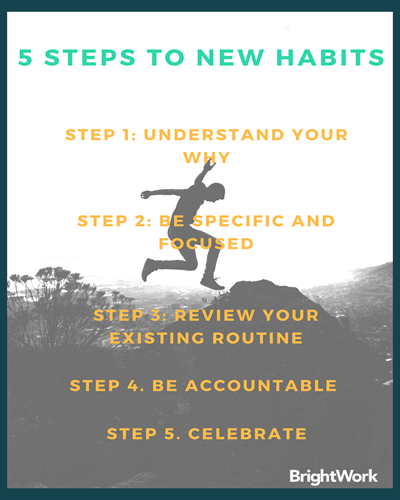Think about your day so far. What activities have you completed since you woke up? I imagine this list will include things like brushing your teeth, grabbing a coffee, listening to your favorite radio station on the way to work, checking emails, and listening to your voicemail.
Each of these activities is a habit, a regular practice or behavior. 40-45% of our daily activities are actually habits, meaning our life is the culmination of our habits.
Developing new, effective habits is key to collaborative project management success. However, habits are also notoriously hard to form and give up! In this article, I will explore five ways to identify and create new habits that last.
Habits and Collaborative Project Management
The importance of personal and professional habits to project management is discussed in a few different contexts in our free book, Collaborative Project Management: A Handbook. To summarize, habits are key to:
- Leadership: Effective leaders actively cultivate a range of positive habits to help guide and nurture their team. Habits help leaders to act consistently, garnering trust and respect from colleagues.
- REP: Quite often, people struggle to make long-lasting, meaningful change. At BrightWork, we have crafted the “REP” approach to personal change management. REP stands for Research, Execute, and Post-Mortem. The process is designed to be repeated any time new skills, habits, or practices are desired.
- Personal Energy Management: Habits such as daily exercise, regular sleep, and a positive morning routine recharge your physical energy levels, helping you to get more from your time.
- Attitude: Projects, like life, can take many unexpected twists and turns. Our attitude determines how we deal with such challenges and issues. You can develop a positive attitude by investing in your daily habits.
- Goals: Identifying and setting goals is core to personal leadership, which in turn, impacts your ability to lead a team. Goals are long-term objectives you are striving towards, and impact on several aspects of project leadership from time management to motivation and decision making. Think of goals as the final destination and habits as smaller pitstops along the way. Developing each habit is another milestone and an opportunity to refuel for the next step.
Understanding How Habits Work
“There’s something almost magical about understanding how habits work, because studies show that once you understand, once you think about the structure of a habit, it becomes easier to change that habit. And once you change that habit, you start making these small, incremental adjustments to your day that over a year or over a decade can add up to a huge difference’’. Charles Duhigg, The Power of Habit: Why We Do What We Do in Life and Business.
Habits have three elements:
- The cue or behavior trigger reminds you to take an action, for example, your phone rings.
- The routine or the habit in action; in this instance, answering the phone.
- Rewards, the benefit of the action. By answering the phone, you know who is ringing you.
Focusing on the cue and rewards is critical to implementing new habits successfully. Firstly, we need to embed habits into our existing daily routine. Studies suggest habits take around 90 days to form and stick. Relying on motivation or trying to remember to carry out an action will fail in the long-term. L
et’s say you need to update your tasks in a collaborative project site. Setting up a calendar reminder to complete this activity each morning after you check your emails will make it easier to make the change. Over time, it will just become part of your morning routine.
Secondly, reward is the craving that creates the habit in the first place. Each time a habit is executed, we experience a rush of dopamine and look forward to completing the task again. Updating your task list daily will save time when preparing weekly and monthly status reports, and improve stakeholder communication, leading to more project success. Great result!
Now that we’ve discussed why habits are important to collaborative project management and how habits work, you may be wondering how to successfully build new habits. Read on for a five-step process you can start implementing today.

5 Steps to Create Habits That Last
1.Understand Your Why
It’s important to make a change that you want to make, not something you feel you should do. Habits are easily compromised when we become stressed or demotivated. You may feel like you should run a marathon this year; however, you also know that a busy schedule will make it difficult to train consistently so you could opt to work towards a 10k run instead.
2. Be Specific and Focused
Whilst we would all love to be happier, healthier, and wealthier, striving for vague habits often leads to failure. If you would like to be happier, a more practical approach is to practice gratitude each day. Small habits build to larger changes and benefits, for example, daily exercise is proven to reduce procrastination.
A specific habit is easier to plan and visualize, which leads to better outcomes. Instead of daydreaming about crossing the finish line of your 10k race, visualize your daily run. If you can’t break down your habit into smaller, actionable steps, it may be too unrealistic.
3. Review your Existing Routine
As I mentioned above, integrating habits into your existing routine will make them stick. This can be as simple as setting up a calendar reminder or preparing a healthy lunch every morning after breakfast.
Start by making a list of your daily habits, activities you already carry out, and look for opportunities to introduce new behavior. The idea is to develop ‘tiny habits’ that culminate in a larger habit; as explained in by Dr. BJ Fogg below, flossing just one tooth a day after brushing your teeth is an easy way to develop the habit of flossing.
Pick a habit that is easy to start and can be broken into smaller, ‘tiny habits’. Completing these tiny habits will boost your confidence and commitment to change.
4. Be Accountable
Share your new habit with a friend or colleague, and ask for their help. Returning to our previous example, ask a team member to check your task updates each day for a few weeks.
Another route to effective habits is a habit tracker, a tool for monitoring your behaviors. Used to record whether a behavior did or did not take place each day, habit trackers can range from a simple notebook to paid apps. Opt for a tracker that takes less than one minute to complete.
5. Celebrate
Reward is the final component of habit. A reward can be as simple as saying ‘well done’ each time you complete your habit. Dwell on your reward when working on your new habit; repeated activity and rewards will help the habit to form.
So much of our daily lives are habits, activities that happen on autopilot. We just do “things” at a certain time in a particular way. Let’s harness the potential of habits to make positive changes, both personal and professional.

